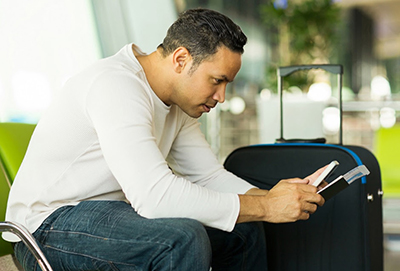 Airline passengers in Brazil are using technology more and more throughout their journey and are moving in big numbers to use self-service on their smart phones, personal computers and at kiosks. These are the results of a survey released today by global air transport IT provider, SITA.
Airline passengers in Brazil are using technology more and more throughout their journey and are moving in big numbers to use self-service on their smart phones, personal computers and at kiosks. These are the results of a survey released today by global air transport IT provider, SITA.
The SITA Passenger IT Trends Survey 2015 was carried out at eight international airports in Brazil that together manage 62% of all the country’s passenger traffic. It reports that Brazil’s passengers are very positive about using self-service technology.
When it comes to checking in for flights, 80% of passengers in Brazil are positive about web check-in and 76% about self-service kiosks. This compares to only 65% of passengers being positive about checking in at a desk.
At the moment, more than half of the passengers surveyed checked in at a desk, which is higher than the global average of 43%, but looking ahead the trend is dramatically moving away from this. In fact, when asked which technology they would use for their next flight, face-to-face check-in was only picked by 28% with a strong move to using personal computers (35%) and mobile devices (24%).
Elbson Quadros, SITA Senior Sales Director, Brazil, said: “Rising passenger numbers can put a strain on services at the airport but by using technology such as web and mobile check-in airlines and airports can reduce the pressure. Here in Brazil it is encouraging to see that passengers are happy to use self-service and in fact, would like more. Airlines and airports can be confident that focusing on self-service technology, especially mobile services will make passengers happier.”
Though nearly three quarters of Brazilian passengers (72%) feel positive throughout the travel experience, this is lower than the global average of 80%. It demonstrates passengers’ desire for new services which take advantage of mobile and web technologies. Passengers here are connected, 83% carry smartphones – higher than the 23% ownership rate across the general population[1] – and they want to use them when travelling.
Some new services have real appeal in Brazil: 83% of passengers would definitely use flight updates to their mobiles, while 72% want updates on their baggage collection. This is a clear opportunity for airlines and airports in Brazil to improve the passenger experience by providing information that the passengers want sent directly to their mobile phones.
The survey also shows that more passengers check-in bags at airports in Brazil than in other parts of the world. Here again they have a desire to use self-service. Currently 17% of passengers use self bag drop services but this is set to grow to 35% over the next year.
The passengers surveyed were happiest during dwell time at the airport, the time between clearing security and boarding the flight. There was a peak of 93% positive emotions at this stage of the journey with 84% valuing entertainment and 83% eating and drinking, considerably higher than global averages. These statistics are encouraging for those airports in Brazil that have focused on the concessionary model and are providing high-quality entertainment and food and beverage services to their passengers at this point of the journey.




